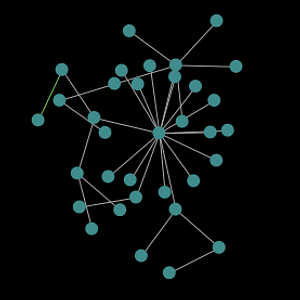- About the Course:
In this course you'll learn about the tools used by scientists to understand complex systems. The topics you'll learn about include dynamics, chaos, fractals, information theory, self-organization, agent-based modeling, and networks. You’ll also get a sense of how these topics fit together to help explain how complexity arises and evolves in nature, society, and technology. There are no prerequisites. You don't need a science or math background to take this introductory course; it simply requires an interest in the field and the willingness to participate in a hands-on approach to the subject.
- About the Instructor(s):
 Melanie Mitchell is Professor of Computer Science at Portland State University, and External Professor and Member of the Science Board at the Santa Fe Institute. She is the author or editor of five books and over 70 scholarly papers in the fields of artificial intelligence, cognitive science, and complex systems. Her most recent book, Complexity: A Guided Tour, published in 2009 by Oxford University Press, won the 2010 Phi Beta Kappa Science Book Award. It was also named by Amazon.com as one of the ten best science books of 2009, and was longlisted for the Royal Society's 2010 book prize.
Melanie Mitchell is Professor of Computer Science at Portland State University, and External Professor and Member of the Science Board at the Santa Fe Institute. She is the author or editor of five books and over 70 scholarly papers in the fields of artificial intelligence, cognitive science, and complex systems. Her most recent book, Complexity: A Guided Tour, published in 2009 by Oxford University Press, won the 2010 Phi Beta Kappa Science Book Award. It was also named by Amazon.com as one of the ten best science books of 2009, and was longlisted for the Royal Society's 2010 book prize.- Course Team:
 John Balwit (Teaching Assistant) is a Ph.D. student in the Systems Science program at Portland State University. He has a background in biology education and current research interests in theoretical biology, evolvability and natural selection. John is also interested in the use of agent based modeling and machine learning techniques to explore questions in the evolution of cooperation, the nature of social dilemmas and the patterns in human decision-making under extreme conditions. His current emphasis is on the use of computer models and computational exercises to effectively teach general audiences about the constellation of topics called Complexity Science.
John Balwit (Teaching Assistant) is a Ph.D. student in the Systems Science program at Portland State University. He has a background in biology education and current research interests in theoretical biology, evolvability and natural selection. John is also interested in the use of agent based modeling and machine learning techniques to explore questions in the evolution of cooperation, the nature of social dilemmas and the patterns in human decision-making under extreme conditions. His current emphasis is on the use of computer models and computational exercises to effectively teach general audiences about the constellation of topics called Complexity Science.
 John Driscoll (Teaching Assistant) has a background in architecture and is a Ph.D. student in Systems Science at Portland State University. He has worked with, and credits as mentors, Dean Bryant Vollendorf, Professor Emeritus, UNCC, and George Hascup, AAP, Cornell University. John is primarily interested in the rationalization of city planning and the emerging field of the science of cities, the goal being to apply theory and methods from complex systems science to the research, analysis and design of urban environments.
John Driscoll (Teaching Assistant) has a background in architecture and is a Ph.D. student in Systems Science at Portland State University. He has worked with, and credits as mentors, Dean Bryant Vollendorf, Professor Emeritus, UNCC, and George Hascup, AAP, Cornell University. John is primarily interested in the rationalization of city planning and the emerging field of the science of cities, the goal being to apply theory and methods from complex systems science to the research, analysis and design of urban environments.
 Erin Kenzie (Program Assistant) is a Ph.D. student in Systems Science at Portland State University. Her interests are in the fields of urban sustainability and behavioral and social science research methods.
Erin Kenzie (Program Assistant) is a Ph.D. student in Systems Science at Portland State University. Her interests are in the fields of urban sustainability and behavioral and social science research methods.
- How to use Complexity Explorer:
- How to use Complexity Explorer
- Enrolled students:
-
6,964
- Course dates:
-
30 Sep 2013 5am UTC to
01 Feb 2014 8am UTC - Prerequisites:
-
None
- Like this course?
- Donate to help fund more like it
- Twitter link
- Follow Course on Twitter
Syllabus
- What is Complexity?
- Dynamics and Chaos
- Fractals
- Information, Order, and Randomness
- Genetic Algorithms
- Cellular Automata
- Models of Biological Self-Organization
- Models of Cooperation in Social Systems
- Networks
- Scaling in Biology and Society
- Wrapping Up; Virtual Field Trip
